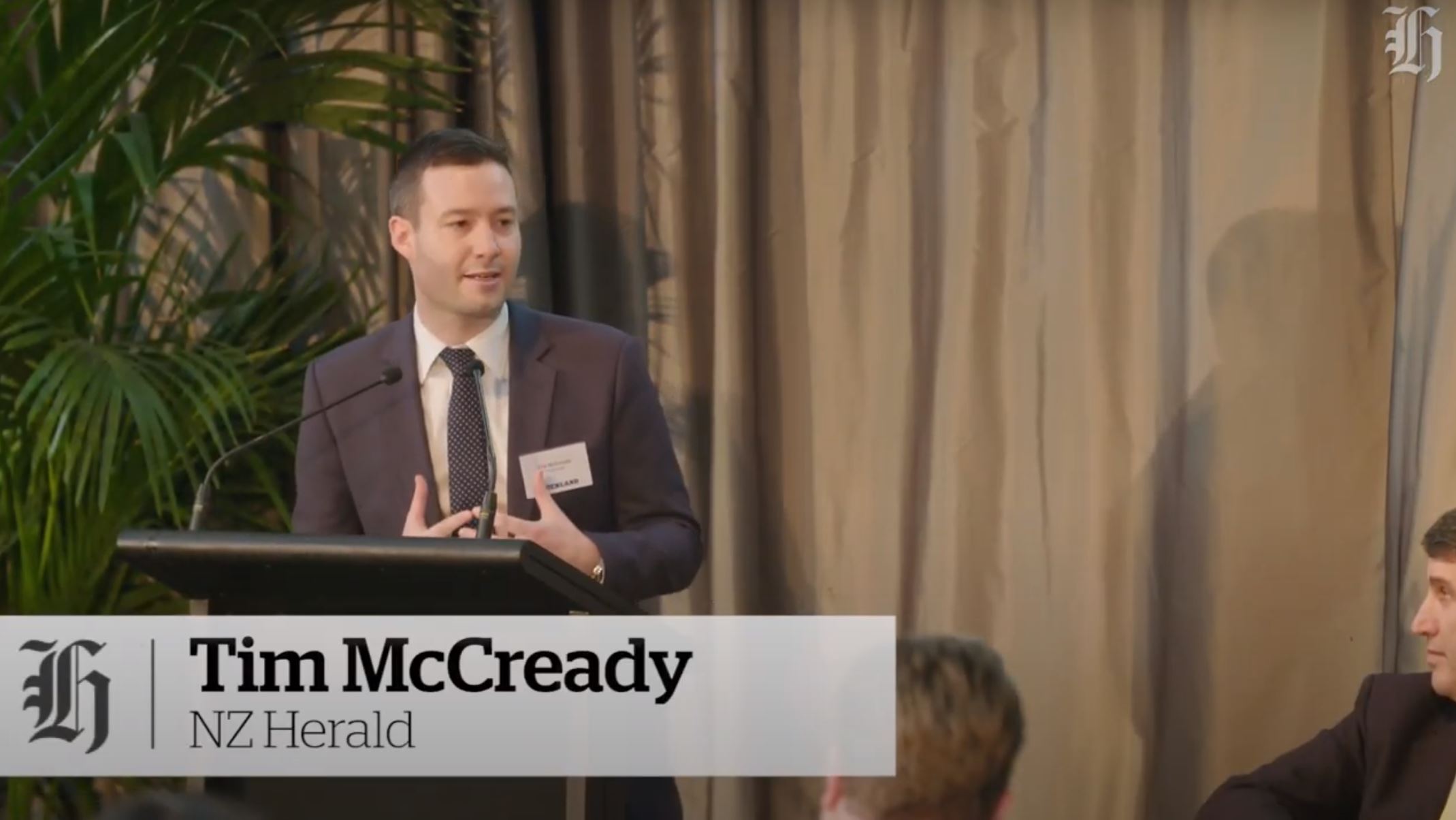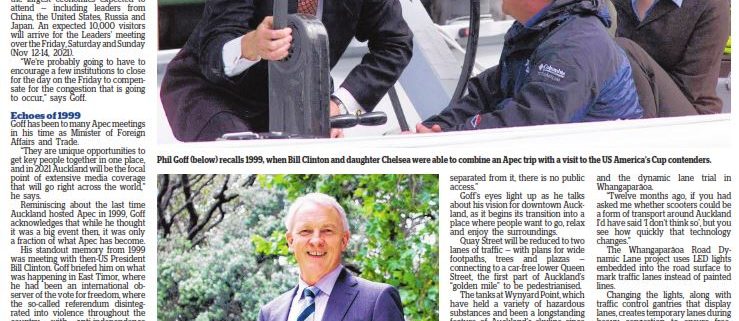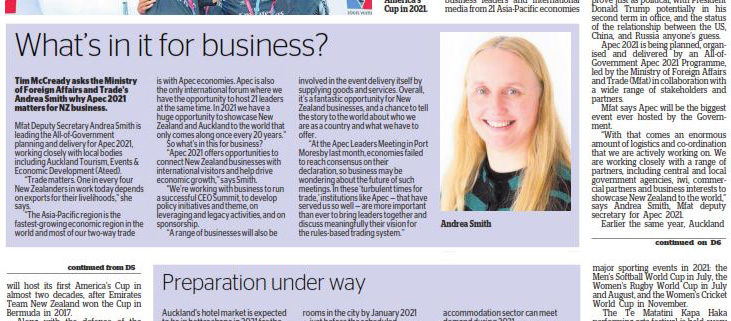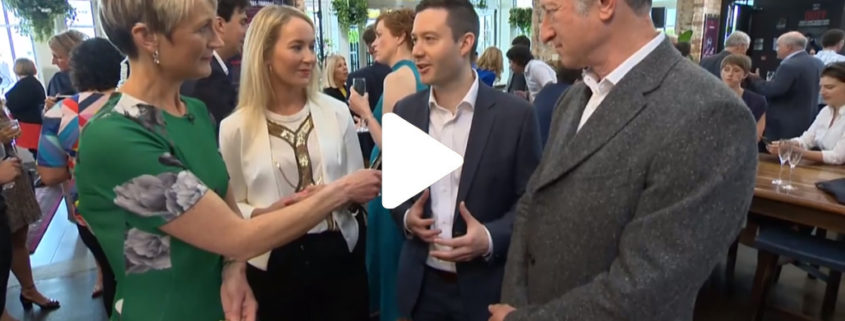Project Auckland: 2021 — a city transformed (NZ Herald)
2021 is a chance to set a target for some of the things we can do around the city, Auckland Mayor Phil Goff tells Tim McCready.
Auckland Mayor Phil Goff says the big events of 2021 will not only put Auckland on the world stage, but will provide the impetus to expedite Auckland’s transformation into a truly international city.
He likens the programme of events — including the America’s Cup, Apec, the Women’s Rugby World Cup, the men’s Softball World Cup, the Women’s Cricket World Cup and the kapa haka Te Matatini Festival — to royal visits of the past:
“People would get out and cut their hedges and paint their fences. This is a chance for us to set a target for some of the things we can do around the city — particularly our interface between the city and the waterfront.”
Goff says the events provide an opportunity for Auckland to show itself off to the world.
Apec will receive massive international attention, with global superpowers and representatives of the largest economies expected to attend — including leaders from China, the United States, Russia and Japan. An expected 10,000 visitors will arrive for the Leaders’ meeting over the Friday, Saturday and Sunday (Nov 12-14, 2021).
“We’re probably going to have to encourage a few institutions to close for the day on the Friday to compensate for the congestion that is going to occur,” says Goff.
Echoes of 1999
Goff has been to many Apec meetings in his time as Minister of Foreign Affairs and Trade.
“They are unique opportunities to get key people together in one place, and in 2021 Auckland will be the focal point of extensive media coverage that will go right across the world,” he says.
Reminiscing about the last time Auckland hosted Apec in 1999, Goff acknowledges that while he thought it was a big event then, it was only a fraction of what Apec has become.
His standout memory from 1999 was meeting with then-US President Bill Clinton. Goff briefed him on what was happening in East Timor, where he had been an international observer of the vote for freedom, where the so-called referendum disintegrated into violence throughout the country, with anti-independence militants creating chaos.
“It was a chance — even as an opposition MP at that time — to meet some of the key world leaders, because of the unique role I had in relation to East Timor which was at the forefront of that particular gathering,” says Goff.
He notes the world has changed a lot since 1999 — and so has New Zealand. “Auckland is now projecting New Zealand onto the international scene as a really global city. One that is high-tech, moving ahead, one that people want to do business in.”
A packed schedule
Goff says that 2021 will provide a platform for Auckland to impress the people that are visiting — and all those watching from afar — that New Zealand is a small but highly competent, efficient country with high-tech innovation and a high quality of life.
“The America’s Cup will showcase the beauty of our environment with the broadcasting of the harbour, as well as our sporting skills and cutting-edge technology in yachting,” he says.
And while the Men’s Softball World Cup and the Women’s Rugby World Cup won’t be as big as the America’s Cup in terms of audience numbers, he says they are international events that will play to different markets: “Different people will pay attention to different aspects of what Auckland is doing that year. The Te Matatini Festival will be a great chance to showcase Auckland as the world’s largest city for Māori and Pasifika people — something that gives Auckland its identify.
“Our ability to leverage off the events in 2021 for investment, tourism and human capital is very important.”
One of Goff’s slogans for Auckland is ‘the place where talent wants to live’.
“That means retaining and attracting talent, and to do that, you’ve got to look like an international city humming with action.
“The centre of the city will epitomise that for Auckland — but with impacts across the whole city.”
According to the Rider Levett Bucknall Crane Index, there are 90 cranes in Auckland — an increase of 8.4 per cent over the past six months. Construction of new apartment towers, hotels, and shopping centres are contributing to the count.
“We’ll see a transformation of our skyline in Auckland, and we’ll start to look much more like a global city than a traditional New Zealand city,” says Goff.
He is looking forward to that growth, and seeing the city merge with the waterfront precinct.
“For most of this city’s history, we’ve had the red fence along the waterfront. The public have been separated from it, there is no public access.”
Goff’s eyes light up as he talks about his vision for downtown Auckland, as it begins its transition into a place where people want to go, relax and enjoy the surroundings.
Quay Street will be reduced to two lanes of traffic — with plans for wide footpaths, trees and plazas — connecting to a car-free lower Queen Street, the first part of Auckland’s “golden mile” to be pedestrianised.
The tanks at Wynyard Point, which have held a variety of hazardous substances and been a longstanding feature of Auckland’s skyline since the 1980s are being removed.
“The America’s Cup will use this area for bases in the first instance, and start to open that area up.
“You’ll see further developments of Wynyard Quarter and Britomart that will make them fantastic places to be,” says Goff.
“These are all places that will make our city a destination, not just a place to pass through.”
Smart cities
Goff sees technological solutions as a key component of Auckland’s transformation into an international city.
He points to the Safeswim programme as an example, which earlier this year won the Smart Water category of the IDC Smart Cities Asia/Pacific Awards 2018. A joint initiative between Auckland Council, Surf Lifesaving Northern Region and Auckland Regional Public Health Service, Safeswim provides up to date information to the public about Auckland’s beaches — including water quality, safety, and long-term health warnings.
“We’re the first city in New Zealand that can tell you — in real time — what the water quality is in beaches this morning, this afternoon, and tomorrow morning,” says Goff.
“We’re world-leading in that area, and we’re using it for the benefit of the people in Auckland.”
Other smart technologies are quickly — and dramatically — revolutionising transport in Auckland, including electronic scooters and the dynamic lane trial in Whangaparāoa.
“Twelve months ago, if you had asked me whether scooters could be a form of transport around Auckland I’d have said ‘I don’t think so’, but you see how quickly that technology changes.”
The Whangaparāoa Road Dynamic Lane project uses LED lights embedded into the road surface to mark traffic lanes instead of painted lines.
Changing the lights, along with traffic control gantries that display lanes, creates temporary lanes during heavy congestion to ensure free-flowing traffic. The project won Best Technical Solution at the Association of Local Government Information Management Awards.
Similar systems are used in Auckland along the Panmure Bridge and Auckland Harbour Bridge. The system is quick to build and around one-tenth the cost of alternative solutions.
“Auckland Transport is going to use that same technology in probably another half a dozen sites around the city,” says Goff.
“We can use technology to improve our transport systems. We can predict when something is going to happen or is starting to happen, and make changes that make it easier to get around the city.”
Goff says technology can be used to make every aspect of life better for Aucklanders:
from biological nutrient removal plants for more environmentally friendly wastewater treatment, to automatically resettable possum traps, to online resource consent filing, dog registration and rates payments.
“Council is tapping into innovations which enable us to do more for less — providing better services at a lower cost,” he says.
“It means we’ve been able to have a city that is growing by 30,000 — 40,000 a year, but we haven’t had the growth in staffing that is proportionate to the growth in population.
“Our per capita staffing levels are actually dropping — we’re providing better services at a lower cost to our rate payers.”
Goff drops hints on Mayoral race
“I am thinking seriously of running for the mayoralty again,” says Auckland Mayor Phil Goff. “I don’t want to go into a job and leave it partly completed.”
Goff says he will make a formal decision on whether to run again for mayor early next year. But he adds that three years is a very short space of time to change a city in the way he’d like to see it happen.
“Particularly with our 10-year budget, it has been transformational, with the biggest ever level of capital investment in our infrastructure. But that’s time-lagged.
“To actually see things you have put in place develop, takes longer than a three-year term.”
Goff talks about the significant progress that is being made towards Auckland infrastructure: the City Rail Link, Skypath along the Harbour Bridge, Seapath between Takapuna and Northcote Point and cycleways.
Other initiatives he wants to see progress further include cleaning up Auckland’s harbours, making Waiheke predator-free and saving the kauri from dieback in the Waitakere Ranges.
“When you come into a job like this — depending on the electorate’s willingness to re-elect you — you don’t want to say ‘I’ve done a stint there, that was nice, now I’ll move on.’
“You want to say: ‘this transformation is critical — not just for me, but for my kids’ generation, for my grandkids’ generation’.
“You want to see that through so you feel that you have been part of something that has made Auckland a better place to be in.
“So that gives you a bit of a hint of the way I’m thinking,” he says.
Based on previous years, Goff expects there to be around 12 other people vying for the mayoralty.
So far only John Palino — a two-time mayoral candidate — has formally announced his candidacy. National MP for Tāmaki Simon O’Connor is contemplating running, and has said he will make a formal decision in the New Year. Property developer and brothel owner John Chow as well as Waipareira Trust chief executive John Tamihere are also considering a tilt for the mayoral chains.
Project Auckland: Auckland in the spotlight (NZ Herald)
2021 is shaping up to be a major year on the Auckland calendar, with major political, business, sporting and cultural events taking place.
The annual Asia-Pacific Economic Co-operation (Apec) will be held in Auckland for the first time in 22 years. Hosting Apec involves a 12-month period from December 2020 to November 2021, culminating in the leaders’ meeting where political leaders, their ministers of trade and foreign affairs, CEOs, youth leaders, business leaders and international media from 21 Asia-Pacific economies will descend on the City of Sails.
Apec was last held in Auckland in 1999, and saw US President Bill Clinton arrive to a ‘rock star’ welcome and also marked the first visit to New Zealand by a Head of State from China — then-President Jiang Zemin.
While in Auckland in 1999, the world’s two biggest powers — China and the United States — resumed talks during an hour-long meeting, after heightened tensions following the accidental bombing of the Chinese Embassy in Belgrade during the NATO bombing of Yugoslavia.
This time around will no doubt prove just as political, with President Donald Trump potentially in his second term in office, and the status of the relationship between the US, China, and Russia anyone’s guess.
Apec 2021 is being planned, organised and delivered by an All-of-Government Apec 2021 Programme, led by the Ministry of Foreign Affairs and Trade (Mfat) in collaboration with a wide range of stakeholders and partners.
Mfat says Apec will be the biggest event ever hosted by the Government.
“With that comes an enormous amount of logistics and co-ordination that we are actively working on. We are working closely with a range of partners, including central and local government agencies, iwi, commercial partners and business interests to showcase New Zealand to the world,” says Andrea Smith, Mfat deputy secretary for Apec 2021.
Earlier the same year, Auckland will host its first America’s Cup in almost two decades, after Emirates Team New Zealand won the Cup in Bermuda in 2017.
Along with the defence of the oldest trophy in international sport, Auckland hopes to stage a successful event in March.
According to a report prepared for the Ministry of Business, Innovation and Employment by Market Economics, the America’s Cup is expected to deliver between $600m-$1b in value-add to the New Zealand economy over the 2018-2021 period and an employment boost of between 4700 and 8300 jobs.
The race will showcase New Zealand on a global stage, forge new business links and be the catalyst behind the development of better waterfront infrastructure.
The previous America’s Cup regattas held in Auckland in 2000 and 2003 each generated around half a billion dollars of economic activity.
Auckland Tourism, Events & Economic Development (Ateed) says collaboration will be critical for both major events: “2021 will certainly be a bumper year with major events spread throughout the year and Auckland will be ready to welcome these events,” says Steve Armitage, General Manager Destination.
“A collaborative programme between the Auckland Council Group, the Ministry of Business, Innovation and Employment, Mana Whenua and America’s Cup Event Ltd is already well established and working diligently to prepare for the 36th America’s Cup, while Ateed and Mfat have signed a Memorandum of Understanding and are working together with other government agencies to prepare for Apec 2021.”
Auckland will also host three other major sporting events in 2021: the Men’s Softball World Cup in July, the Women’s Rugby World Cup in July and August, and the Women’s Cricket World Cup in November.
The Te Matatini Kapa Haka performing arts festival is held every two years at different locations in New Zealand. In February 2021 it will also take place in Auckland, and is expected to draw in around 30,000 participants and spectators.
Says Armitage: “We see 2021 as a significant opportunity to advance the outcomes of the city’s destination strategy — Destination AKL2025 — which has an increased focus on destination management and sustainability that will add value for Aucklanders and our visitors.
“Over the past decade Auckland has built an enviable reputation for hosting a diverse range of global major events, showcasing the city, delivering an outstanding experience for visitors and leaving a favourable, lasting impression.”
New Zealand certainly left an impression on President Clinton. Before departing in 1999, he said: “This has been a magical trip.
“I think every person, when he or she is young, dreams of finding some enchanted place, of beautiful mountains and breathtaking coastline, clear lakes and amazing wildlife.
“Most people give up on it because they never get to New Zealand.”
Preparation under way
Auckland’s hotel market is expected to be in better shape in 2021 for the 36th America’s Cup compared to the 2000 or 2003 Cup defences in Auckland.
The city’s newest hotel, the five-star SO Sofitel, opened last month offering a volcanic theme throughout the hotel’s 130 rooms that range from $469 to $4500 a night.
Other hotels under way include the five-star Park Hyatt (195 rooms, opening 2019), SKYCITY Horizon (300 rooms, opening 2019), the Cordis extension (additional 250 rooms, opening 2020), Novotel (310 rooms, opening 2020).
But there are still concerns from some in the tourism industry that a shortage of hotel accommodation is likely.
Research from commercial real estate firm CBRE has found, based on the current pipeline of hotels planned or under construction, that there will be an additional 2200 rooms in the city by January 2021 — just before the scheduled America’s Cup race — on top of the current supply of 10,000 rooms.
But as international and domestic tourism markets continue to grow, hotel room demand will increase over the next three years. Even with the new builds taking place, demand will likely exceed supply by the time Team New Zealand set sail.
However, Peter Hamilton, director hotels, valuation and advisory services at CBRE New Zealand said other accommodation providers — such as private rooms through the likes of Airbnb — would ease accommodation pressures while the Cup is contested.
Over leaders’ week, Apec will see an estimated 10,000-13,500 attendees arrive. It is likely that the US, China and Russia will each take over entire hotels with officials, business delegations, and security.
With events spread throughout the year, Ateed is confident that the accommodation sector can meet demand during 2021.
“Apec Leaders’ Week takes place for a short time during the off-peak period in early November,” says Ateed’s GM Destination Steve Armitage. “There are a number of infrastructure projects underway to support Auckland’s growth and improve the visitor experience, many of which are in the CBD and waterfront area and will be complete or well advanced by 2021.
“An important legacy of the major events the city has successfully hosted is that we have significantly increased our capacity and capability. The city is better placed to ensure the success of 2021.
“The most important message is to plan ahead for Leaders’ Week. We are working closely with Mfat and our partners in the tourism and accommodation sector to help people do exactly that.”
What’s in it for business?
Tim McCready asks the Ministry of Foreign Affairs and Trade’s Andrea Smith why Apec 2021 matters for NZ business.
Mfat Deputy Secretary Andrea Smith is leading the All-of-Government planning and delivery for Apec 2021, working closely with local bodies including Auckland Tourism, Events & Economic Development (Ateed).
“Trade matters. One in every four New Zealanders in work today depends on exports for their livelihoods,” she says.
“The Asia-Pacific region is the fastest-growing economic region in the world and most of our two-way trade is with Apec economies. Apec is also the only international forum where we have the opportunity to host 21 leaders at the same time. In 2021 we have a huge opportunity to showcase New Zealand and Auckland to the world that only comes along once every 20 years.”
So what’s in this for business?
“Apec 2021 offers opportunities to connect New Zealand businesses with international visitors and help drive economic growth,” says Smith.
“We’re working with business to run a successful CEO Summit, to develop policy initiatives and theme, on leveraging and legacy activities, and on sponsorship.
“A range of businesses will also be involved in the event delivery itself by supplying goods and services. Overall, it’s a fantastic opportunity for New Zealand businesses, and a chance to tell the story to the world about who we are as a country and what we have to offer.
“At the Apec Leaders Meeting in Port Moresby last month, economies failed to reach consensus on their declaration, so business may be wondering about the future of such meetings. In these ‘turbulent times for trade,’ institutions like Apec — that have served us so well — are more important than ever to bring leaders together and discuss meaningfully their vision for the rules-based trading system.”




